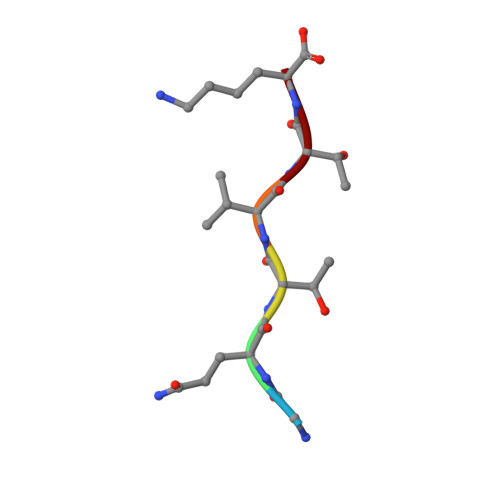Inhibition of amyloid formation of the Nucleoprotein of SARS-CoV-2.
Tayeb-Fligelman, E., Cheng, X., Tai, C., Bowler, J.T., Griner, S., Sawaya, M.R., Seidler, P.M., Jiang, Y.X., Lu, J., Rosenberg, G.M., Salwinski, L., Abskharon, R., Zee, C.T., Hou, K., Li, Y., Boyer, D.R., Murray, K.A., Falcon, G., Anderson, D.H., Cascio, D., Saelices, L., Damoiseaux, R., Guo, F., Eisenberg, D.S.(2021) bioRxiv
- PubMed: 33688654
- DOI: https://doi.org/10.1101/2021.03.05.434000
- Primary Citation of Related Structures:
7LTU, 7LUX, 7LUZ, 7LV2 - PubMed Abstract:
The SARS-CoV-2 Nucleoprotein (NCAP) functions in RNA packaging during viral replication and assembly. Computational analysis of its amino acid sequence reveals a central low-complexity domain (LCD) having sequence features akin to LCDs in other proteins known to function in liquid-liquid phase separation. Here we show that in the presence of viral RNA, NCAP, and also its LCD segment alone, form amyloid-like fibrils when undergoing liquid-liquid phase separation. Within the LCD we identified three 6-residue segments that drive amyloid fibril formation. We determined atomic structures for fibrils formed by each of the three identified segments. These structures informed our design of peptide inhibitors of NCAP fibril formation and liquid-liquid phase separation, suggesting a therapeutic route for Covid-19. Atomic structures of amyloid-driving peptide segments from SARS-CoV-2 Nucleoprotein inform the development of Covid-19 therapeutics.
















